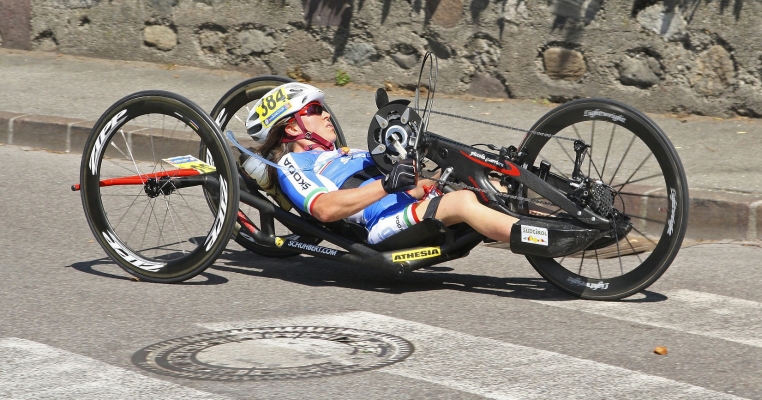A Social Evolution – Disability Rights Activism in Israel
"A revolution is taking place in Israel," says Gidi Zur of Kivunim. In his organization, the goal is to teach young people with various disabilities the skills to live independent lives. Over the past twenty years, Israel has embraced a progressive, more equitable society for Israelis with disabilities. Israel has even established two centers for disability research - Disability Studies Research at Tel Aviv University and the Hebrew University in Jerusalem.
Israel is often called "Startup Nation" for the companies that launch locally and quickly achieve international success and notoriety. Several of these focus on creative solutions in accessibility, ingenious innovations designed to empower people to utilize the computer, access the Internet, navigate the environment, and a higher degree of personal mobility. Israeli academics, politicians, and advocates are moving towards a critical paradigm shift - the social model of disability. In this model, it is a society that disables people through an inaccessible environment and social marginalization.
In 1998, Israel passed The Equal Rights for Persons with Disabilities Law. This highly progressive move was followed up with amendments in 2016. Still, there have been issues with its enforcement. MK Karine Elharar stated that Israel wants to be a modern, open-minded society, but has not yet achieved this. "Everyone is afraid of what we don't know, of what's different from us. Accessibility would be addressed if the Equality Law was fully implemented."
Michelle Manspeizer of Bizchut, the leading and longest-running organization devoted to promoting the rights of persons who have disabilities, said: "The biggest challenge facing people who have disabilities is full implementation of the right of every person with a disability to live independently and fully in the community. …Even though the government has declared the right to live in the community, there is a large gap between its declarations and existing realities."
Another key organization, the Ruderman Family Foundation, has been advocating for people with disabilities for eighteen years. They form dynamic partnerships with agencies, advocates, and academic institutions in Israel and internationally. Galia Granot stated: "The best way is to integrate people with disabilities into society, so they gain life experience that will provide tools and abilities for full integration. A person who lives a full life and works will be able to lead an independent lifestyle."
Yuval Wagner, who sustained a spinal cord injury in 1997, founded Accessibility Israel, which is devoted to building a more inclusive nation. He said that Israel has come a long way but has significant gains to make in education, health, and public transport: "It is very difficult to promote such an issue, however, without the decision-makers recognizing it."
Zvia Admon, the first academic to write about Disability Theory in Israel, stated that the three challenges facing Israelis with disabilities are: employment, accessible transport, and the awareness of society in general. The Equality Law gives people the right to file complaints against non-compliance, but most will not take this step due to cost, time involved, and disruption to their lives. Accessible transport remains a serious issue. While inner-city buses in Israel are primarily accessible, there is no accessible inter-city transportation.
Disability rights activism in Israel
From 2017-2019, disability rights activists organized hundreds of demonstrations demanding an increase in the General Disability Pension. Activist Eyal Cohen was one of the leaders of these protests. As a direct result of persistent efforts by these activists and then MK Ilan Galon, the GDP was set to be substantially increased. Up until recently, however, there was no budget in Israel, due to several concurrent elections and COVID. Now, with a new government, it is hoped the increase will be implemented.
Many interviewees agreed that the path towards an equitable society must be a multi-faceted approach. Top of the list is viable, long-term employment. While much of the public sector (61%) complies with the Equality Laws, there is no data on the private sector. There is also a high rate of poverty among Israelis with disabilities. The Borgen Report stated this year that 24% of Israelis with disabilities live below the poverty line. Many interviewed for this article agreed that poverty among people with disabilities is a critical issue, but more related to viable employment than the GDP. On this issue, Michele Manspeizer stated: "Complete social inclusion in the community is a step in the right direction to ensure that people who have disabilities live in the community in a dignified manner, as well as to eradicate poverty for people with disabilities. Within its fight for the right of people who have disabilities to live in the community, Bizchut is promoting a basket of personally tailored assistance, which will allow people with disabilities to live a dignified life in the community."
Abbass Abbass is the founder and Executive Director at AlManarah - The Association for Arab Persons with Disabilities. He feels Arab-Israelis face dual forms of discrimination. In our discussion, he stated that their main challenges are a paternalistic Arab culture that deems people with disabilities as "unfortunates", and low allocation of resources to Arab towns and villages. In turn, this causes problems with poor infrastructure and lack of access to resources and services. Still, he said, he remains optimistic for the future.
Israel is to be lauded for the significant progress it has made to date. The country has many talented, devoted advocates for disability rights, such as Alex Friedman, Abbass Abbass, Hanan Tal, Eyal Cohen, Hana Akiva, and others fighting passionately for social equality. Although there are many different groups, diversity may be Israel's advantage. Again from Bizchut: "During Corona, Bizchut led a coalition of 60 organizations that protested the Ministry of Health decision to place people with disabilities at the very low end of the list for ventilators. This decision was cancelled after our protests…we work together and this is our strength." These extraordinary individuals and groups are moving Israel on the path towards a more equitable and inclusive society.








Comments